Forge Titanium Ring
Updated : Oct. 24, 2025Forged titanium rings are ring-shaped industrial parts produced from premium titanium and titanium alloys by forging. They are known for high strength, excellent corrosion resistance, and low weight (density only 4.51 g/cm³).
Formed by open-die forging, die forging, or ring rolling, they are typically supplied as custom ring geometries to meet stringent requirements for material performance and dimensional precision in advanced industries, widely serving aerospace, petrochemical, medical implant, and other critical sectors.
Titanium Forged Ring Overview
Size range: OD 200–1300 / ID 100–900 / H (height) 35–250 mm
Maximum capability (custom): OD ≤ 6000 mm / H ≤ 1000 mm (ID per drawing; typically satisfies ID = OD − 2×t, where t is the minimum wall thickness determined by size/alloy/NDT level)
Supply forms: ring-rolled, open-die, or closed-die forging blanks, or machined to drawing; key mating surfaces can reach Ra ≤ 0.8 μm (depends on size and fixturing)
Alloy grades: Gr1, Gr2, Gr5 (Ti-6Al-4V), Gr7, Gr9, Gr11, Gr12, Gr23
Types: seamless rolled ring forgings; open-die titanium ring forgings; closed-die titanium ring forgings; custom non-standard/contoured titanium ring forgings
Applications: aero-engine titanium rings; offshore drilling platform flange rings; medical joint implant titanium rings; marine propulsion system titanium rings; chemical pressure-vessel titanium rings; nuclear-power equipment titanium rings
Surface finishes:
- as-forged: retains the original forged surface, cost-effective, suitable for internal equipment components.
- machined bright surface: precision milled/ground; surface roughness Ra ≤ 0.8 μm; suited for precision assembly parts.
- passivation: chemically forms a dense oxide film to enhance corrosion resistance; recommended for marine and acidic/alkaline environments.
- anodic coloring: forms a colored oxide layer for both appearance and protection; used for decorative structural parts.
Conditions: A / annealed; SR / stress relieved; STA / solution treated & aged; BA / beta annealed
Standards: ASTM B381; ASME SB381; AMS 4920; DIN 17850; JIS H4600; ISO 5832
Certifications: ISO 9001:2015; AS9100; ISO 13485; NACE MR 01075; SGS; BV; ABS
Which Titanium Forged Ring Alloys Can Chalco Supply?
-
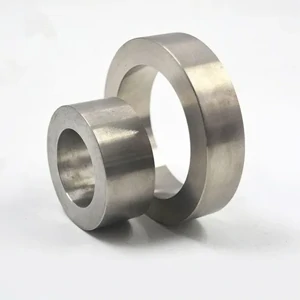
Gr1 commercially pure titanium forged ringsGr1 commercially pure titanium forged rings (Ti ≥ 99.5%) provide excellent electrical and thermal conductivity, outstanding corrosion resistance, and exceptional ductility (elongation ≥24%); they are non-toxic and highly biocompatible. They are suitable for chemical equipment linings (e.g., cryogenic tank liners), light-duty medical implant components (dental implant abutments), electrical parts, and other applications where machinability and material purity are critical.
-

Gr2 commercially pure titanium forged ringsGr2 commercially pure titanium forged rings are the most widely used CP Ti grade in industry. With slightly higher oxygen than Gr1 (≤0.25%), they balance strength and ductility (UTS ≥ 345 MPa, elongation ≥ 20%), offer excellent resistance to seawater and oil-and-gas corrosion, and tolerate working pressures ≤ 30 MPa. Typical applications include oil-drilling pipeline flange rings, seawater-desalination housings, heat-exchanger components, and reactor vessels.
-

Gr5 titanium alloy forged rings (Ti-6Al-4V)Gr5 titanium alloy forged rings, alloyed with 6% aluminum and 4% vanadium, offer high strength (UTS ≥ 895 MPa), excellent heat resistance (continuous service ≤ 400 °C), and strong fatigue performance (fatigue strength ≥ 600 MPa), with a notable weight advantage (about 40% lighter than steel). They are widely used for aero-engine cases, airframe structural connection rings, high-pressure vessels, racing chassis components, and nuclear equipment where extreme strength-to-weight performance is required.
-

Gr7 titanium alloy forged rings(Ti-0.15Pd)Gr7 titanium alloy forged rings with 0.12–0.25% palladium offer markedly enhanced corrosion resistance, especially in strong media such as hydrochloric and sulfuric acids (corrosion rate ≤0.1 mm/year in 5% HCl), while maintaining good fabricability. Typical applications include equipment for strong-acid chemical service (plating tanks, reactor flange rings), flue-gas desulfurization/denitration system components, and oil-and-gas production hardware.
-

Gr9 titanium alloy forged rings(Ti-3Al-2.5V)Gr9 titanium alloy forged rings (Ti-3Al-2.5V) contain 3% aluminum and 2.5% vanadium, offering strength between CP titanium and Gr5, excellent weldability, good formability, and outstanding corrosion resistance in marine environments. Typical applications include shaft sleeves for marine propulsion systems, aerospace hydraulic-line fittings, offshore platform structural components, and heat-exchanger parts.
-

Gr23 titanium alloy forged rings(Ti-6Al-4V Eli)Gr23 titanium alloy forged rings are the extra-low interstitial (ELI) version of Gr5, with reduced interstitials—C ≤ 0.08%, O ≤ 0.13%, N ≤ 0.03%—providing higher fatigue strength and superior biocompatibility with no sensitization concerns. They are suitable for high-end medical implants (e.g., acetabular rings, spinal fixation rods) and precision aerospace instrument components (e.g., gyroscope frames) where material purity and reliability are critical.
Chemical Composition % of Titanium Forged Ring
| STANDARD | CHEMICAL COMPOSITION (weight %, ma√ or range) | ||||||||||
|---|---|---|---|---|---|---|---|---|---|---|---|
| Grade | UNS | N | C | H | Fe | O | Al | V | Pd | Mo | Ni |
| No | |||||||||||
| GR 1 | R50250 | 0.03 | 0.08 | 0.015 | 0.2 | 0.18 | |||||
| GR 2 | R50400 | 0.03 | 0.08 | 0.015 | 0.3 | 0.25 | |||||
| GR 3 | R50550 | 0.05 | 0.08 | 0.015 | 0.3 | 0.35 | |||||
| GR 4 | R50700 | 0.05 | 0.08 | 0.015 | 0.5 | 0.4 | |||||
| GR 5 | R56400 | 0.05 | 0.08 | 0.015 | 0.4 | 0.2 | 5.5-6.75 | 3.5-4.5 | |||
| GR 7 | R52400 | 0.03 | 0.08 | 0.015 | 0.3 | 0.25 | 0.12-0.25 | ||||
| GR 9 | R56320 | 0.03 | 0.08 | 0.015 | 0.25 | 0.15 | 2.5-3.5 | 2.0-3.0 | |||
| GR 12 | R53400 | 0.03 | 0.08 | 0.015 | 0.3 | 0.25 | 0.2-0.4 | 0.6-0.9 | |||
| GR 23 | R56401 | 0.03 | 0.08 | 0.0125 | 0.25 | 0.13 | 5.5-6.5 | 3.5-4.5 | |||
Mechanical Properties of Titanium Forged Ring
| STANDARD | CHEMICAL COMPOSITION (weight %, ma√ or range) | MECHANICAL PROPERTIES (min) | |||
|---|---|---|---|---|---|
| Grade | UNS | Tensile | Yield | El. | Red. |
| No | Mpa | Mpa | % | % | |
| GR 1 | R50250 | 240 | 138 | 24 | 30 |
| GR 2 | R50400 | 345 | 275 | 20 | 30 |
| GR 3 | R50550 | 450 | 380 | 18 | 30 |
| GR 4 | R50700 | 550 | 483 | 15 | 25 |
| GR 5 | R56400 | 895 | 828 | 10 | 25 |
| GR 7 | R52400 | 345 | 275 | 20 | 30 |
| GR 9 | R56320 | 620 | 483 | 15 | 25 |
| GR 12 | R53400 | 483 | 345 | 18 | 25 |
| GR 23 | R56401 | 828 | 759 | 10 | 15 |
Titanium Forged Ring Specifications and Sizes
| Size range (mm) | OD 200–1300 / ID 100–900 / H 35–250. |
|---|---|
| Applicable standards | ASTM B381 (U.S.), ASME SB381, AMS 4928 (Ti-6Al-4V), AMS 4967 (Ti-6Al-4V ELI), DIN 17850 (EU), JIS H4600 (JP), ISO 5832 (INTL) |
| Certifications | ISO 9001:2015, AS9100, ISO 13485, NACE MR 01075, SGS, BV, ABS. |
Chalco's Featured Titanium Forged Rings
-
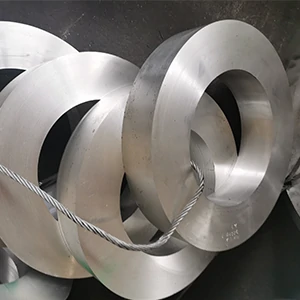
Ring-rolled titanium forged ringsProduced by piercing the forging blank and ring-rolling to expand diameter, with concentricity controlled per drawing. After machining, assembly-grade fit is achievable; typical machined surfaces reach Ra ≤ 1.6 μm depending on size and fixturing. Concentricity/coaxiality reports can be provided, and mechanical properties are uniform. Widely used for aero-engine cases and high-precision gear rings where dimensional accuracy and structural integrity are critical, reducing downstream machining allowance.
-
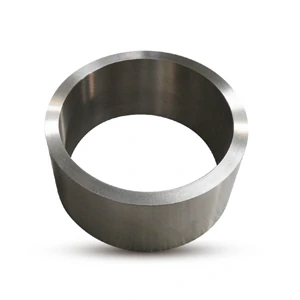
Closed-die titanium forged ringsFormed with custom dies and delivered to drawing tolerances for high dimensional accuracy. After machining, key mating faces reach assembly grade (typical example ±0.02–0.05 mm, depending on size and tooling), with feasibility confirmed during drawing review; complex non-standard geometries are supported. Well suited to medical implants (e.g., joint stems) and precision automotive driveline parts, helping shorten customer assembly cycles.
-

Surface-treated titanium forged ringsChemically treated to form a dense oxide film, with salt-spray testing available per ASTM B117. Test hours depend on the surface system (passivation/anodizing/coating type and thickness) and are confirmed to project requirements with reports provided. Ideal for marine service and acid/alkali chemical equipment, often eliminating additional anticorrosion coatings and lowering maintenance costs.
-
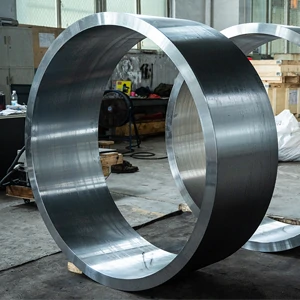
Large-diameter titanium forged ringsManufactured via repeated upsetting, piercing, and expanding, enabling outer diameters up to 6000 mm and heights ≤ 1000 mm subject to drawing evaluation. Wall thickness and mechanical/UT grades are defined by alloy and process to meet load-bearing and inspection requirements. Used in heavy equipment such as large pressure-vessel flanges and offshore drilling platform base rings to satisfy extra-large size needs.
-
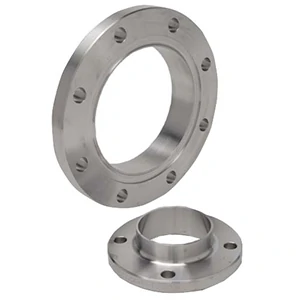
Near-net shape titanium forged ringsNear-net forging with features such as steps, thickened flanges, trapezoidal sections, and grooves, followed by finish machining to reduce material removal by 20–60% and enable assembly-ready delivery. Key mating faces and slots meet drawing tolerances, and assembly-grade surfaces are available (typical machined Ra ≤ 0.8 μm). Final tolerances and positional accuracy depend on size, fixturing, and process planning and are confirmed during quotation and drawing review. Suitable for labyrinth seals, gear/bearing housings, chemical pump/valve parts, and aerospace structural components requiring high fit precision and lightweighting.
Applications of Titanium Forged Rings
Aerospace
Titanium forged rings are widely used in engine cases/segment rings, sealing and connection flanges, landing-gear and structural connection rings, and fittings in hydraulic and fuel systems at load-bearing or sealing locations.
With high specific strength, low density, and excellent fatigue performance, they maintain dimensional and property stability at intermediate temperatures (≈ ≤300–350 °C). Continuous circumferential grain flow from ring rolling improves crack resistance and service life versus discs cut from plate.
This addresses the aerospace need for "lightweight + high reliability,” increasing safety margins without adding volume while reducing fuel burn and maintenance frequency. Common grades are Ti-6Al-4V (Gr5) and Ti-6Al-4V ELI (Gr23), supplied to ASTM B381 with EN 10204 3.1 and required UT/NDT reports to facilitate finish machining to fit dimensions and surface roughness.


Medical
In medical devices and selected implant applications, titanium rings are used for external fixation frame rings, dental repair connection rings/sleeves, sealing rings for cleanroom and vacuum vessels, and mating sections of high-strength surgical instruments.
They offer biocompatibility, non-magnetic behavior, and low allergenicity; ELI grade (Gr23) provides higher purity and toughness. Controlled surface roughness and cleanliness aid assembly and sterilization, addressing the challenge of long-term stability and safety in contact with the human body or medical media by reducing rejection and imaging interference, lowering instrument failure risk, and extending service life.
Common choices are Gr23/Gr5 or industrial CP Gr2, forged to ASTM B381 and alignable with ISO/ASTM medical material requirements, with options for bright machining, pickling/passivation, or identification anodizing.
Chemical Engineering and Petrochemicals
In strongly corrosive chloride- and sulfide-bearing media, titanium rings serve as transition rings for heat-exchanger tube sheets, corrosion-resistant flange rings, column/vessel connectors, mating rings in pump and valve bodies, and other critical seals.
CP and alloyed titanium resist pitting, crevice corrosion, and stress-corrosion cracking; in activated/reducing media, Gr7 (Ti-0.2Pd) and Gr12 (Ti-0.3Mo-0.8Ni) perform especially well.
They solve the rapid-failure problem of conventional stainless steels in chlorides and seawater by greatly extending overhaul intervals, reducing leakage and downtime losses, and lowering life-cycle costs. Forgings and UT evidence can be provided to ASTM B381, and H₂S service can be coordinated to NACE MR0175/ISO 15156.
Electrolysis (Chlor-alkali, Nonferrous, Green Hydrogen)
Electrolytic industries use titanium rings for bus/compression rings, anode/cathode chamber connection flange rings, diaphragm-cell sealing rings, and mating bases for coated anodes/cathodes.
Titanium is highly inert and dimensionally stable in chloride electrolytes and compatible with MMO/iridium-based coating systems; controlled flatness and roughness reduce contact resistance and improve current efficiency.
This addresses issues under long-term energization and strong corrosion—fixture loosening, seal degradation, and polarization efficiency loss—thereby extending cell life and stabilizing output. Gr1/Gr2 are commonly used substrates, with Gr7 selected for harsher corrosion; supply follows ASTM B381, with optional surface pretreatment and long-duration immersion/polarization qualification to project specs.
Electroplating
In nickel/chrome/PCB plating lines, titanium rings are commonly applied as plating-tank sealing rings, anode-basket end rings, fixture/jig support rings, sight-glass/manhole cover rings, and corrosion-resistant mating components.
Titanium is inert to most plating chemistries and does not leach contaminants, maintaining dimensions and strength during prolonged immersion; reliable sealing is easily achieved with liners such as PTFE/PP/PVDF. This mitigates scrap, line stoppages, and coating non-uniformity caused by corrosion and contamination, stabilizing yield and lowering operating costs.
Gr2 is commonly used, with Gr7/Gr12 for severe or crevice-sensitive conditions; forgings are supplied to ASTM B381 with surfaces and tolerances finished to fixture standards.
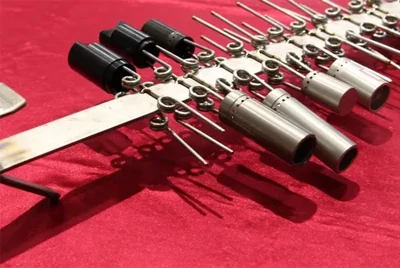
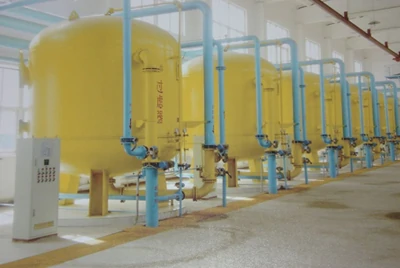
Nuclear Power Equipment
Applications include condenser and seawater-cooling flanges on the seawater side and in ambient-temperature auxiliary systems, corrosion-resistant mating rings in chemical volume-control and water-treatment units, and seal interfaces in pumps and valves.
Thanks to excellent corrosion resistance in seawater and chloride environments, non-magnetic and low-contamination characteristics, long-term dimensional stability, and the support-load reduction from lightweighting, titanium rings help suppress efficiency loss and unplanned outages caused by corrosion and scaling.
They increase availability and O&M safety while reducing long-term replacement and maintenance costs.
Processing Methods for Titanium Forged Rings
Manufacturing Process
The typical route heats the billet, performs repeated upsetting and edging, then punches a center hole in the preform with a die. The hole is expanded with tooling to near-net size, followed by rough and finish machining as required. Semi-finished rings are then inspected, packaged, and shipped.
Surface Finishing
As-forged finish is economical and durable and is suitable for subsequent rough machining or heat treatment.
Machined bright finish can reach surface roughness Ra ≤ 0.8 µm, ideal for clean or assembly environments such as medical and vacuum applications.
Passivation forms a dense oxide film to enhance corrosion resistance and is recommended for marine and chemical service.
Anodic coloring in black, blue, and other tones can be used for identification or appearance, selected according to service conditions and standards.
Packaging
Waterproof film with shock-absorbing foam on wooden pallets is used as the standard package, and large rings are additionally braced with steel frames to prevent deformation in transit.
Medical-grade rings are sealed in sterile vacuum packaging to avoid contamination.
Export-standard, seaworthy moisture-proof packaging can be customized to customer requirements.
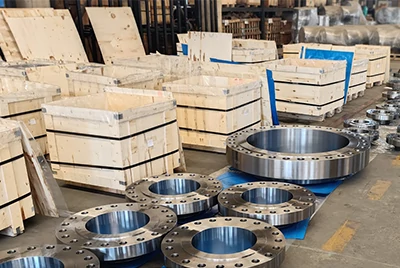
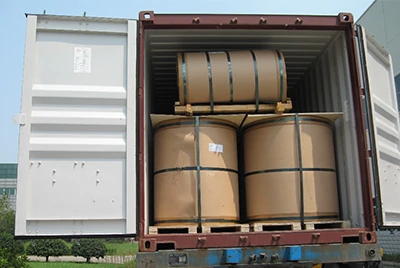
Inspection and Testing
Chemical composition is verified by spectrometric analysis to confirm alloy conformity.
Mechanical properties are tested for tensile, impact, and hardness to validate strength and toughness.
Nondestructive testing includes UT ultrasonic testing and RT radiographic testing to detect internal defects.
Dimensional accuracy is checked with CMM measurement to ensure tolerance compliance, and third-party reports such as SGS or BV can be provided.
Why Choose Chalco as Your Titanium Forged Ring Supplier?
Free Sample Shipment, Quality You Can See
We can ship in-stock samples so you can verify alloy chemistry, dimensional accuracy, and surface finish against your project requirements. Test reports travel with the samples, helping you place orders with confidence and avoid risk in subsequent volume purchases.
Customized Production for Special Requirements
We manufacture non-standard sizes, non-circular/contoured geometries, and tailored surface finishes. From drawing review and process planning to final inspection, our end-to-end customization meets aerospace, medical, and chemical service conditions and solves procurement challenges for unconventional sizes.
Stable Product Quality with Complete Documentation
Every ring is inspected before shipment—chemical composition, mechanical properties, and NDT (e.g., UT/RT). We provide a manufacturer’s test certificate (TC) conforming to EN 10204/3.1B and third-party reports (e.g., SGS/BV) to ensure full traceability and compliance.
Complete Alloy Portfolio with Protected Lead Times
We maintain year-round availability of mainstream grades Gr1–Gr23. Regular sizes typically ship in 7–15 days. With a professional forging team and advanced equipment (e.g., 10,000-ton press, precision ring-rolling mill), we can support large orders and urgent requests to keep your production on schedule.
Better Pricing for Larger Volumes
For long-term partners or bulk purchases (single order ≥ 50 pcs), we offer flexible pricing and dedicated discounts. We also provide free technical consulting (e.g., alloy selection for service conditions) and responsive after-sales support (quality issues followed up within 48 hours) to reduce procurement costs and boost project competitiveness.
Chalco Is Your Trusted Titanium Forged Ring Partner
Chalco is a leading supplier focused on stable, high-quality, and customizable titanium ring solutions. With precise control of titanium alloy performance and extensive industry experience, we are widely recognized across aerospace, petrochemicals, medical implants, and marine engineering. Our products span core alloys and processes—from Gr1/Gr2 CP titanium to high-strength Gr5/Gr23, and from as-forged essentials to passivated or anodized premium finishes—covering needs for extreme environments, biocompatibility, and high-precision machining. Whether facing high-temperature/high-pressure engine service or sterile medical standards, we provide targeted solutions.
We supply rings with OD 200–6000 mm and heights up to 1000 mm, with options for contoured/stepped/trapezoidal sections, tight tolerances (minimum tolerance ±0.02 mm), and tailored packaging (e.g., sterile vacuum packs, steel-frame bracing) to match machining and installation needs and reduce downstream processing.
To ensure quality, we employ advanced inspection and control: UT/RT to detect internal defects; tensile/impact/hardness testing to confirm strength; spectrographic analysis for chemistry; and complete production records for end-to-end traceability. We are certified to ISO 9001, AS9100, and ISO 13485 and can deliver regular sizes in 7–15 days. We also offer flexible customization to your drawings and parameters and fast, responsive after-sales service. Contact us for a professional quotation and technical support.
Frequently Asked Questions
Q: How is pricing calculated?
A: Price = titanium alloy raw-material price × ring weight + forging cost + inspection cost + logistics. Because raw-material prices fluctuate, quotes are case-by-case. Please share alloy grade, dimensions, and quantity for an accurate quote. [Contact us]
Q: Can you make non-standard or shaped rings?
A: Yes. We support custom cross-sections (square, trapezoid, stepped), non-standard sizes, and special hole patterns to minimum tolerances of ±0.02 mm. Please provide detailed drawings (dimensions, tolerances, property requirements) so we can design the forging process accordingly.
Q: What are typical lead times?
A: Regular sizes (OD 200–1300 mm) are typically 7–15 days. Custom/large sizes (OD 1300–6000 mm, H ≤ 1000 mm) are about 20–30 days depending on process evaluation and scheduling. Expedited production is available upon request.
Q: Advantages over stainless steel rings?
A: Titanium’s density is ~60% of stainless steel, reducing system weight. Corrosion resistance—especially in seawater and acid/alkali media—is superior, with service life 3–5× longer, cutting maintenance costs. Titanium is also biocompatible for implant use, whereas stainless steel may pose sensitization risks.
Q: How do temperature capabilities differ by alloy?
A: Gr1/Gr2 CP titanium: continuous service ≤ 250 °C for low-to-medium temperatures (e.g., cryogenic/ambient chemical equipment).
Gr5: continuous service ≤ 400 °C for aero engines and high-temperature/pressure vessels.
Gr7: continuous service ≤ 300 °C balancing corrosion resistance and mid-temperature stability for chemical equipment.
Q: How do I calculate ring weight?
A: Use: W = ((OD² − ID²) × π / 4) × H × 4.51 × 10⁻⁶ with OD, ID, H in millimeters and titanium density ρ = 4.51 × 10⁻⁶ kg/mm³.




